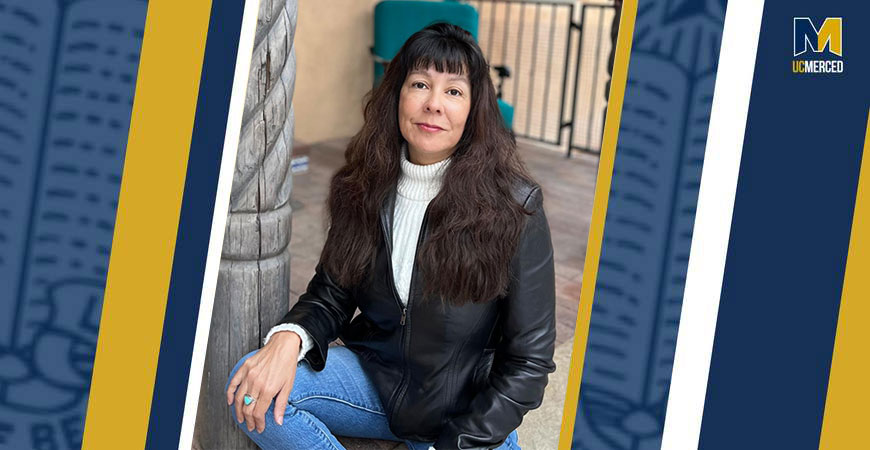
Deborah Taffa, an Indigenous author and educator whose book about growing up in a mixed-race home and struggling with social acceptance was hailed as one the best memoirs of 2024, will make a special visit to Merced this month.
Taffa will make two appearances Tuesday, Feb. 18 to read from her book, “Whiskey Tender,” meet with people and answer questions. The first session is scheduled for noon – 1:30 p.m. in Room 232 of the Kolligian Library (please RSVP). The second is scheduled for 6 – 7 p.m. at the Multicultural Arts Center in downtown Merced, 645 W. Main St. Both events are open to the public and campus community.
“Whiskey Tender” details Taffa’s life from age 3 to 10 as the daughter of a Native American father and Catholic Latin American mother. In addition to descriptions both visceral and tender of her life and family, Taffa weaves vital Indigenous history into the story. One reviewer described the memoir as “a drink you didn’t know you were thirsty for.”
“Whiskey Tender” was a National Book Award finalist and on a 2024 Amazon Editors’ Choice list of best biographies and memoirs, among other accolades.
Taffa, a member of the Kwatsaán and Laguna Pueblo nations, directs the Master of Fine Arts in creative writing at the Institute of American Indian Arts in Santa Fe, N.M.
“Deborah Taffa offers a lived and written perspective of the intersections of personal and national histories of underrepresented and unrepresented individuals and narratives,” UC Merced writing studies Professor Susan Varnot said. “We are proud to bring an empowered, Indigenous woman of her stature to UC Merced to share her experiences as a human and writer.”
Taffa’s appearances are co-sponsored by the School of Social Sciences, Humanities and Arts; the Native American Students Coalition; UC Merced Library; and the Division of Equity, Justice and Inclusive Excellence.
Deborah Taffa Q&A
We asked Taffa five questions about writing, teaching and “Whiskey Tender”:
What do you tell Indigenous students trying to find their voice in expressing their personal history and that of their people?
Do what you must to ensure your stories survive while also finding allies in the industry you can trust. It's OK to be skeptical about the aim of editors and publishing houses. Get enough of your book done before approaching or sharing with outsiders so you are sure about its direction and don't feel manipulated into casting parts of your story through a socially sanctioned (mainstream) lens.
It's easy for Indigenous authors to be pressured into seeing their histories and beliefs as magical realism or too specific for universal understanding. You only get one debut. Be patient. Be stubborn. Let it develop through many revisions. Know your story and never let anyone tell you it doesn't fit common stereotypes or tropes.
When someone asks, "How do I become a writer," your answer is ...
Writing is manual labor, like cleaning the house or practicing meditation. It's built on repetition. Add to the habit of sitting daily before a white space, the act of thinking, the patience involved in getting lost and not knowing your direction, and you have the job of the writer minus one thing: ritual.
Writing early in the morning or late at night, the artist feels an expansiveness in their creation. This is not for immediate satisfaction. It isn't a blog post or a comment on social media. The words you write, if done right, will elicit visceral reactions, and touch people beyond your death. Never minimize the importance, magic and beauty that is the act of creation.
What is your North Star working at the Institute of American Indian Arts? What do you want to teach or convey?
I try to create a sense of mutual support, a non-competitive environment for my MFA students. I remind myself regularly: I am working at an Indigenous institute so I can relax. We may have our differences, but we are all on the same page, working for the future of our children and grandchildren.
Taking this job has lessened the burden of representation for me. If one of us publishes, we all succeed. The weight of responsibility I feel to get Indigenous stories out is alleviated by spreading the work out among allies. Artists need community. At the IAIA this is easy; our goals are the same.
While writing "Whiskey Tender," did you work to balance how much it is about your family with how much is about the historical and continuing struggles of Indigenous peoples?
I didn’t worry about the balance until the final edits. The manuscript went up for sale as a memoir that relied heavily on my family stories. The personal arc, the coming-of-age, was important to me. I wanted people to feel what it was like to be an Indigenous girl growing up in the shadow of the American Dream. With each draft, I sought to further amplify the visceral impact of my language, and to lessen the over-intellectualization of any given moment. I privileged what was happening to her, to make the book more accessible to young Native readers. It felt imperative to uncover the emotion and develop pathos with those readers (in particular).
When the book was finished, I saw how much of my family lore touched on hidden histories, governmental policies, nuclear colonization and different forms of violence. I realized amplifying these connections would catapult my story into a greater U.S. context, and that the trauma in my family could be framed in a way that felt more ethical due to the scope. The bulk of the research was, therefore, done in reverse. During the final year of editing, after the book had sold, I took family lore and expanded on it with help from the IAIA library. It was in this period that I added much of the historical facts and context.
What word would you use to describe "Whiskey Tender," and why?
Reclamation. The story corrects misunderstandings and honors the profound contribution of my elders. They gave to this land during wartime as veterans. They sacrificed their land and national resources for the betterment of all Americans, and even as that sacrifice was forced upon them, they maintained good will toward their non-Native neighbors. I have seen grace in my elders, and that grace enabled me to grow into a successful member of my community. With this book, I wanted to honor their beauty, reclaim the pejoratives, and re-envision all that is good in Indigenous culture for my readers.




 Public Information Officer
Public Information Officer

